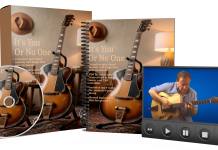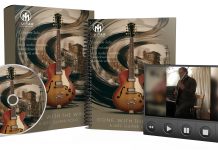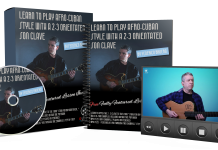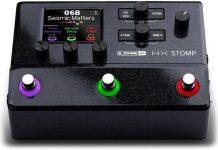This post may contain affiliate links. As an Amazon associate, Google associate as well as associate for other programs, Guitar & Music Institute may earn commissions from qualifying purchases.

In order to become a skilled guitarist, it’s important to have a solid foundation in guitar theory. Understanding the basics of music theory will help you master chords, scales, and melodies, and elevate your playing to a whole new level. By following a logical progression and learning the essential concepts in a step-by-step manner, you can quickly become proficient in beginner guitar theory.
Key Takeaways:
- Learning guitar theory is essential for becoming a well-rounded and versatile guitarist.
- Mastering the fundamentals of guitar theory, such as reading music notation and learning basic chords, is crucial.
- Applying guitar theory to the fretboard allows you to navigate the guitar with ease and confidence.
- Guitar theory helps you develop musicality and express yourself on the instrument.
- Continuing to learn and explore guitar theory will help you advance and enhance your playing.
The Importance of Learning Guitar Theory
Many beginner guitar players may be tempted to skip over learning music theory and focus solely on learning how to play songs. However, understanding guitar theory is essential for becoming a well-rounded and versatile guitarist. It provides the foundation for understanding how music works, helps you communicate with other musicians, and gives you the tools to create your own unique style. By learning guitar theory, you can unlock the keys to the musical universe and take your playing to new heights.
When you learn music theory, you gain a deeper understanding of the fundamental building blocks of music. This knowledge allows you to better grasp the structure of songs, identify musical patterns, and make more informed musical choices. By understanding the relationships between chords, scales, and progressions, you can improvise, compose, and arrange your own music.
Another benefit of learning guitar theory is the ability to communicate effectively with other musicians. When you understand music theory, you can easily share your ideas, collaborate with bandmates, and contribute to musical arrangements. This translates into smoother rehearsals and performances, as everyone involved can speak the same musical language.
Understanding music theory also empowers you to develop your own unique style as a guitarist. By studying the techniques and musical concepts used by famous guitarists, you can analyze their playing and incorporate their ideas into your own musical vocabulary. This allows you to create your own signature sound and stand out as a guitarist.
Overall, learning guitar theory is a valuable investment of your time and effort. It provides a solid foundation for your musical journey, enhances your overall musicianship, and opens up a world of creative possibilities. Whether you aspire to become a professional musician or simply want to improve your playing skills, understanding guitar theory is key to achieving your goals.
The Fundamentals of Guitar Theory
Before diving into the more advanced concepts of guitar theory, it’s important to master the fundamental building blocks. These include:
1. Reading Music Notation and Guitar Tablature
Learning to read standard music notation and guitar tablature is crucial for understanding and interpreting sheet music and guitar tablature accurately. This skill allows you to play music from a variety of sources and expand your repertoire.
2. Open Position Notes
Open position notes are the notes played on the guitar strings without using any frets. Mastering open position notes helps you familiarize yourself with the guitar’s fretboard and serves as a foundation for playing chords and scales.
3. Essential Music Theory Concepts
Understanding essential music theory concepts, such as scales, intervals, keys, and chord construction, provides a framework for comprehending how music works. This knowledge enables you to analyze songs, create harmonies, and develop your own musical ideas.
4. Basic Open Position Chords
Basic open position chords are the foundation of guitar playing. They are formed by pressing strings against specific frets to produce specific harmonic sounds. Mastering these chords allows you to strum along to your favorite songs and play in different keys.
5. Strumming Patterns
Strumming patterns are rhythmic patterns created by combining upstrokes and downstrokes with various accents. Learning different strumming patterns enhances your rhythmic sense and adds dynamics to your playing.
6. Tuning by Ear
Tuning your guitar by ear involves using your ears to match the pitch of each string to a reference pitch. This skill is essential for playing in tune and developing your ear for music.
7. Barre Chords
Barre chords are movable chords that allow you to play any major or minor chord in any key using the same chord shape. Mastering barre chords expands your chord vocabulary and provides flexibility in playing different musical styles.
8. Pentatonic and Major Scales
The pentatonic and major scales are essential scales used in many genres of music. Learning these scales in different positions and understanding their patterns unlocks the ability to play melodies, solos, and improvisations.
9. Position Playing
Position playing refers to playing melodies, scales, and chords in different areas of the guitar neck. This technique allows you to access different tonalities, expand your range, and create unique musical textures.
10. Minor Scales and Extended Chords
Minor scales, such as the natural minor, harmonic minor, and melodic minor, add depth and emotion to your playing. Extended chords, such as seventh chords and beyond, create richer harmonies and allow for more complex chord progressions.
Mastering these fundamental elements of guitar theory will enhance your understanding of music and open up a world of possibilities for your playing. Keep practicing, experimenting, and exploring new concepts to continue growing as a guitarist.
| Guitar Theory Fundamentals | Description |
|---|---|
| Reading Music Notation and Guitar Tablature |
Interpret and play sheet music and guitar tablature accurately. |
| Open Position Notes | Familiarize yourself with the guitar’s fretboard using open position notes. |
| Essential Music Theory Concepts |
Understand scales, intervals, keys, and chord construction. |
| Basic Open Position Chords | Master foundational chords for strumming and playing in different keys. |
| Strumming Patterns | Learn various rhythmic patterns to add dynamics to your playing. |
| Tuning by Ear | Develop your ear for music and play in tune by tuning your guitar by ear. |
| Barre Chords | Play any major or minor chord using movable barre chord shapes. |
| Pentatonic and Major Scales | Explore essential scales for melodies, solos, and improvisation. |
| Position Playing | Master playing in different areas of the guitar neck for unique tonalities. |
| Minor Scales and Extended Chords | Add emotion and complexity to your playing with minor scales and extended chords. |
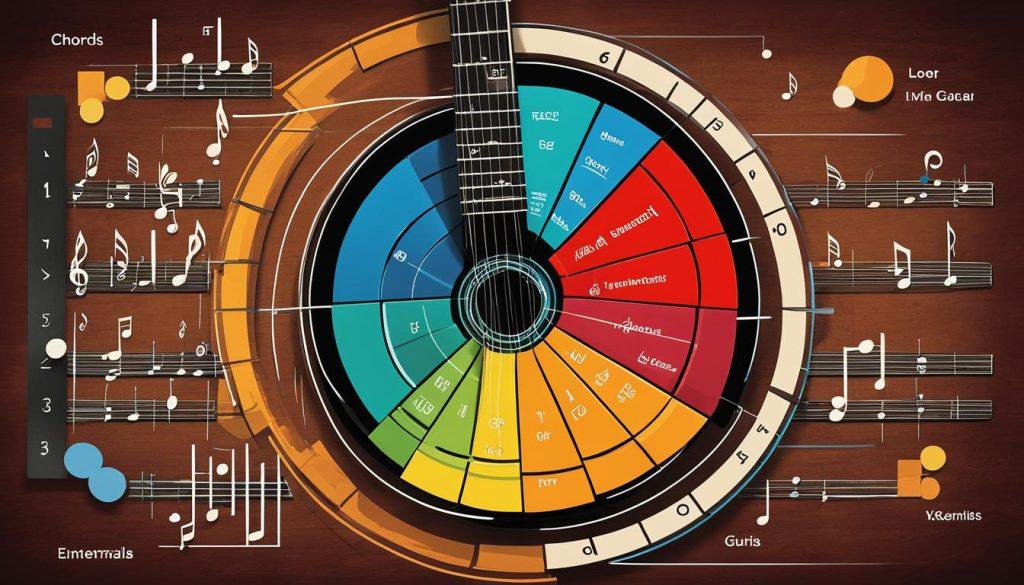
Applying Guitar Theory to the Fretboard
Now that you have gained a solid foundation in guitar theory, it’s time to apply that knowledge to the fretboard. By connecting your theoretical understanding to the physical instrument, you can truly bring guitar theory to life in your playing.
One of the key aspects of applying music theory to guitar is visualizing scales and chords on the fretboard. As you learn different scales and chords, take the time to map them out on the fretboard. This will help you see the relationships between notes and understand how they fit together.
Experimenting with different fingerings and voicings is another crucial step in applying theory to the fretboard. Try playing the same chord or scale in various positions on the neck. This will expand your knowledge of the instrument and enable you to play the same musical ideas in different ways.
As you delve deeper into guitar theory, you’ll discover that it not only informs your playing choices but also opens up a world of creative possibilities. By understanding the underlying principles, you can make conscious decisions about the notes you play, the chords you use, and the overall sound you create.
In order to solidify your understanding of guitar theory in practice, consider exploring different genres and styles of music. Each genre has its own set of harmonic and melodic conventions, and by applying theory to these styles, you can unlock their unique sounds and techniques.
To further enhance your practical guitar theory skills, take advantage of the many resources available. Check out our latest free and paid guitar books and downloads at gmiguitarshop.com. These resources can provide additional exercises, lessons, and insights to help you strengthen your application of guitar theory to the fretboard.
Practical Tips for Applying Guitar Theory to the Fretboard
| Tip | Description |
|---|---|
| Visualize the fretboard | Map out scales and chords on the fretboard to understand note relationships. |
| Experiment with fingerings and voicings | Play the same chord or scale in different positions to expand your playing possibilities. |
| Apply theory to different genres | Explore various musical styles to understand how theory influences different sounds and techniques. |
| Utilize resources | Access educational materials and online resources to deepen your practical guitar theory skills. |
By applying music theory to the fretboard, you can take your guitar playing to new heights. Remember, practice and experimentation are key to fully integrating theory into your playing. So grab your guitar, apply what you’ve learned, and unlock the boundless potential of practical guitar theory.

Unlocking Musicality with Guitar Theory
Guitar theory is not just about memorizing scales and chords; it’s about developing musicality. By understanding the principles of music theory, you can make informed choices about how to express yourself on the guitar. This includes using theory to enhance your playing through dynamics, phrasing, rhythm, and improvisation. By combining your technical skills with a deep understanding of music theory, you can become a more expressive and dynamic guitarist.
Developing Musicality with Guitar Theory
Developing musicality is about going beyond playing the notes on the page or the fretboard. It’s about infusing emotion, creativity, and personal expression into your playing. Guitar theory provides the framework to understand how the different elements of music work together, allowing you to create musical moments that resonate with both you and your audience.
- By learning about dynamics, you can vary the volume and intensity of your playing, adding depth and emotion to your performances.
- Understanding phrasing enables you to shape your melodies and solos, creating musical phrases that capture the listener’s attention.
- Knowing different rhythm patterns and time signatures allows you to add groove and drive to your playing, enhancing the overall feel of your music.
- Using improvisation techniques based on music theory empowers you to take risks, explore new ideas, and express your unique musical voice.
When you combine your technical skills, such as fretting, picking, and strumming, with an understanding of musical concepts, you unlock a world of possibilities for self-expression. Guitar theory becomes a guiding force that helps you communicate your musical ideas effectively and artfully.
Continuing Your Journey in Guitar Theory
Mastering beginner guitar theory is just the beginning of your journey as a guitarist. To continue advancing in guitar theory, there are plenty of resources available to help you expand your knowledge.
Online guitar theory courses provide a convenient and structured way to learn intermediate guitar theory. These courses offer comprehensive lessons, interactive exercises, and opportunities for feedback and progress tracking. They cover topics such as advanced chord constructions, modal theory, improvisation techniques, and more.
Instructional books are another valuable resource for learning guitar theory. They provide in-depth explanations, examples, and exercises that allow you to delve deeper into specific areas of interest. Look for books written by renowned guitarists and educators, as their expertise can guide you through complex concepts with clarity and practicality.
Educational websites dedicated to guitar theory offer a wealth of free resources and materials. These websites often feature articles, tutorials, videos, and downloadable resources that cover a wide range of guitar theory topics. They can be a valuable supplement to your learning, providing additional explanations, examples, and insights.
Resources for Learning Guitar Theory
- GuitarTheory.com – An online platform offering a comprehensive curriculum for guitar theory, from beginner to advanced levels. Access interactive lessons, practice exercises, and quizzes to strengthen your understanding.
- Guitar World – A popular guitar magazine with a dedicated section on guitar theory. Browse their website for informative articles, lessons, and tips from renowned guitarists.
- JustinGuitar – An acclaimed guitar education website offering free lessons and resources for guitarists of all levels. Explore their theory section for beginner-friendly explanations and exercises.
Remember, continued study and practice are essential for advancing in guitar theory. Explore different resources, experiment with various learning methods, and strive for a balance between theory and practical application. As you deepen your understanding, you’ll unlock more complex concepts and techniques, and take your guitar playing to the next level.
Conclusion
Congratulations on taking the first steps towards mastering beginner guitar theory! By understanding the fundamentals, applying theory to the fretboard, developing your musicality, and continuing to learn and grow, you will unlock the full potential of your guitar playing.
Learning guitar theory is a journey that requires dedication and practice. As you explore and experiment with different concepts and techniques, you’ll discover new possibilities and expand your musical boundaries. Remember to enjoy the process and embrace the joy of learning and discovering new things on your guitar.
To further enhance your guitar theory skills, be sure to check out our latest free and paid guitar books and downloads at https://gmiguitarshop.com. These resources can provide you with additional guidance and exercises to deepen your understanding and take your playing to the next level.
Keep pushing yourself, stay curious, and never stop exploring the world of guitar theory. With time, dedication, and a willingness to learn, you can become a confident and skilled guitarist. May your guitar journey be filled with endless inspiration and exciting musical discoveries. Happy playing!
FAQ
Why is it important to learn guitar theory?
Understanding guitar theory provides a foundation for understanding how music works, helps you communicate with other musicians, and gives you the tools to create your own unique style.
What are the fundamental building blocks of guitar theory?
The fundamental building blocks of guitar theory include reading standard music notation and guitar tablature, learning open position notes, understanding essential music theory concepts, mastering basic open position chords, practicing various strumming patterns, tuning your guitar by ear, playing barre chords, exploring pentatonic and major scales, experimenting with position playing, and delving into minor scales and extended chords.
How can I apply guitar theory to the fretboard?
To apply guitar theory to the fretboard, you need to understand how the concepts you’ve learned translate to the actual guitar. This involves visualizing scales and chords on the fretboard, experimenting with different fingerings and voicings, and exploring how music theory informs your playing choices.
How can I unlock my musicality with guitar theory?
By understanding the principles of music theory, you can make informed choices about how to express yourself on the guitar. This includes using theory to enhance your playing through dynamics, phrasing, rhythm, and improvisation.
How can I continue advancing in guitar theory?
To continue advancing in guitar theory, there are plenty of resources available to help you expand your knowledge. Online guitar theory courses, instructional books, and educational websites can provide further guidance and exercises to deepen your understanding.
Source Links
- https://www.metronomeonline.com/checklist-guitarist-learn
- https://nationalguitaracademy.com/guitar-theory/
- https://www.stringkick.com/blog-lessons/guitar-music-theory/
This post may contain affiliate links. As an Amazon associate, Google associate as well as associate for other programs, Guitar & Music Institute may earn commissions from qualifying purchases.






